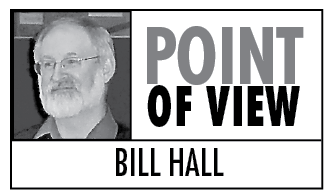The referendum to repeal Alaska’s new oil tax legislation gives citizens the power to decide what is good for Alaska. It challenges us to make a simple choice about a complex issue where facts are scarce and arguments are many.
But arguments without facts are opinions, and opinions are based on assumptions and motives that are not always visible. To be useful, opinions require trust as a substitute for facts. So what do we know? How can we decide? And who can we trust?
What do we know? We know that Gov. Sean Parnell proposed Senate Bill 21 (SB 21) as a solution to the problem of declining state revenues caused by declining production of oil. He argued, “Legislation is necessary to drive new investment to create new Alaska production and new opportunities for Alaskans.”
SB 21 repealed the progressive tax structure in ACES to encourage long-term planning and investment in new production. Its purpose was to reduce state revenue from oil taxes, thereby increasing oil industry profits that could be invested in new production. This shift of income from the state to the industry was intended to provide capital for investment — not increase profits for a very profitable industry.
How can we decide what benefits Alaska? It will be good if the benefits exceed the costs. The costs are decreased state revenues from oil taxes now and into the future. The benefits are increased state revenues from increased oil production in the future. What needs to happen for SB 21 to deliver on the governor’s promise?
1. Current state oil tax revenues must decline, thereby increasing oil industry profits available for investment.
2. The oil industry must invest their tax savings in new production, although they are not required to do so under this legislation.
3. Increased investment must increase production. This could happen by increasing the rate of extraction of existing resources or by finding new oil. Increasing production from existing fields would deplete known resources faster at the lower tax rate in SB 21. How does this benefit the state?
4. New oil needs to be discovered on state lands.
5. Future oil taxes must generate income to the state that will exceed the costs of granting the tax break in SB 21. How can citizens be sure that the state income given up today will be recovered, at a profit, in the future?
Who can we trust?
Not the oil industry. Like Sen. Gary Stevens, I remember the Amerada Hess court case where a judge ruled the industry cheated Alaska out of nearly $1 billion, the Exxon Valdez oil spill and the VECO corruption scandal. This is an industry that has often proved itself to be untrustworthy, and the argument that repealing SB 21 will cause it to close down or leave Alaska is their latest falsehood.
Not the elected representatives who created this flawed legislation. Too many of them work for the industry or are dependent on the industry for campaign funding.
Not economists who tell us that SB 21 may or may not provide sufficient tax savings to provide the investment capital the governor has promised, but we should support it anyway.
What can we trust? Not SB 21. It does not require performance for pay. It does not specify how, when, or if increases in future production will generate income to repay our investment with interest.
Voting yes to repeal SB 21 will give us a second chance with a new legislature, and hopefully a new governor, to create a tax system that is fair to the industry while maximizing benefits for the people. We can do better.
Bill Hall has facilitated 10 dialogues on the referendum to repeal SB 21 in Anchorage, Fairbanks, Seward, Homer and Cordova as part of an evolving network of library-based civic dialogue called “Let’s Talk Alaska.” He is a lifelong Alaskan with experience in local government, banking, politics and education. The opinions expressed here are his own.


